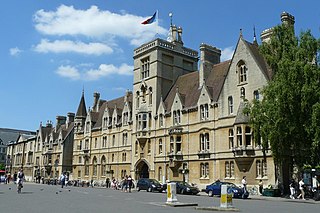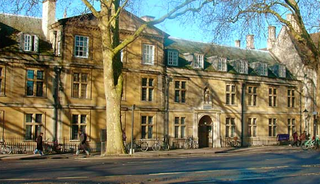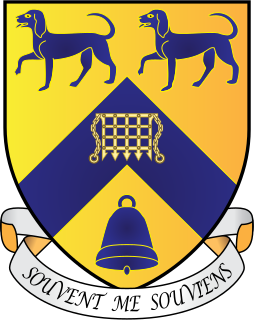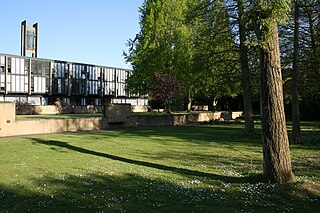This article relies largely or entirely on a single source .(June 2013) |
A Permanent Private Hall (PPH) at the University of Oxford is an educational institution within the university. There are six Permanent Private Halls at Oxford, five of which admit undergraduates. [1] They were founded by different Christian denominations. The principal difference between a college and a PPH is that whereas the former are governed by the fellows of the college, the governance of a PPH resides, at least in part, with the corresponding Christian denomination.

The University of Oxford is a collegiate research university in Oxford, England. There is evidence of teaching as early as 1096, making it the oldest university in the English-speaking world and the world's second-oldest university in continuous operation. It grew rapidly from 1167 when Henry II banned English students from attending the University of Paris. After disputes between students and Oxford townsfolk in 1209, some academics fled north-east to Cambridge where they established what became the University of Cambridge. The two 'ancient universities' are frequently jointly called 'Oxbridge'. The history and influence of the University of Oxford has made it one of the most prestigious universities in the world.
Christianity is an Abrahamic religion based on the life and teachings of Jesus of Nazareth, as described in the New Testament. Its adherents, known as Christians, believe that Jesus Christ is the Son of God and savior of all people, whose coming as the Messiah was prophesied in the Old Testament.

The University of Oxford has 38 Colleges and six Permanent Private Halls (PPHs) of religious foundation. Colleges and PPHs are autonomous self-governing corporations within the university, and all teaching staff and students studying for a degree at the university must belong to one of the colleges or PPHs. These colleges are not only houses of residence, but have substantial responsibility for teaching undergraduate students. Generally tutorials and classes are the responsibility of colleges, while lectures, examinations, laboratories, and the central library are run by the university. Most colleges take both graduates and undergraduates, but several are for graduates only.
Contents
- History
- Private halls
- Permanent private halls
- Permanent Private Halls of the University of Oxford
- Former Permanent Private Halls
- References
- External links
Students at PPHs are members of the University of Oxford and have full access to the University's facilities and activities. Regent’s Park College is the largest PPH, and admits men and women of any age. St Benet’s Hall once only accepted male students, but now admits women as graduates and started to admit women as undergraduates in 2016. Blackfriars, St Stephen’s House and Wycliffe Hall accept only mature students. Campion Hall admits Jesuits and priests of other orders and congregations who are graduate students. It occasionally accepts non-ordained students and ministers of other churches. [2]


















